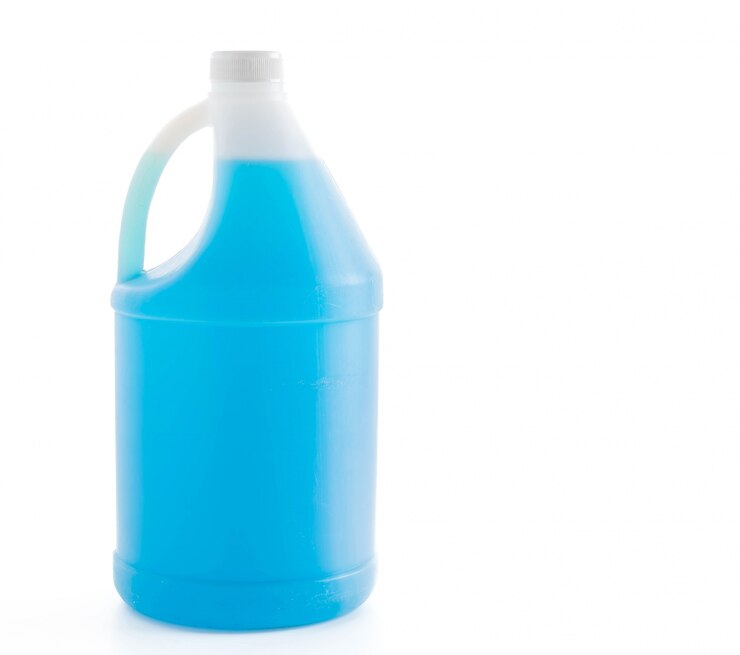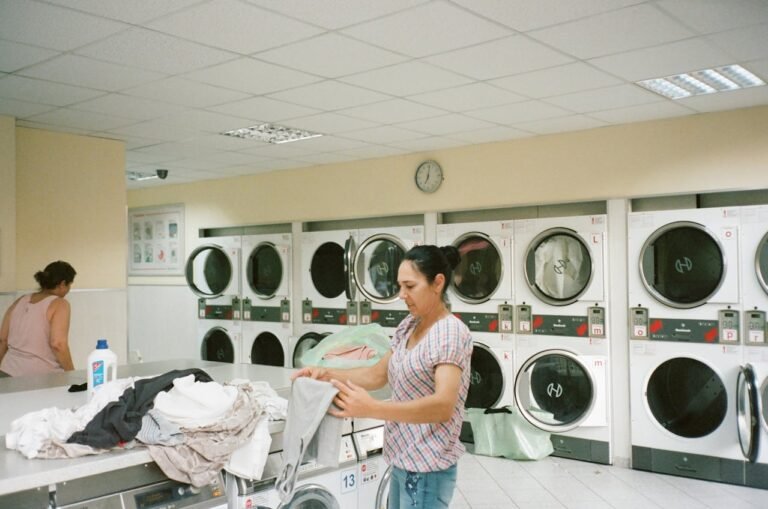Washing Powder vs. Liquid Detergent: Which is More Eco-Friendly?
Choosing between washing powder and liquid detergent for your laundry and cleaning routine often depends on factors such as product quality, price, and personal preference. However, this simple decision can have environmental consequences, as both types of detergent can impact our planet in ways we might not fully realise.
In this article, we will compare powder and liquid detergents to ascertain which laundry product is more eco-friendly. We will also look at scientific studies, expert insight, consumer actions, and environmental data.

In This Article
- The Basics of Washing Powder and Liquid Detergent
- Environmental Impact: A Detailed Comparison
- Expert Insight: Perspectives from Environmental Scientists
- Innovative Solutions: Moving Beyond Traditional Detergents
- Consumer Action: How to Make Your Laundry Routine More Eco-Friendly
- Verdict: Which is More Eco-Friendly – Washing Powder or Liquid Detergent?
- Final Verdict
- Conclusions: The Future of Laundry Detergents
The Basics of Washing Powder and Liquid Detergent
Before we discuss the environmental impact of each detergent, let’s first understand their basic composition and how they work to remove stains and dirt.
Powder Detergent
Laundry detergent powder is manufactured using a combination of chemicals and natural ingredients to remove tough stains and dirt. It is a common household product, particularly for heavy-duty laundry.

Common Ingredients in Powder Detergent
- Surfactants: Break down dirt and grease.
- Bleach: Aids in whitening and sanitising clothes.
- Enzymes: Break down protein-based stains like food and sweat.
- Builders: Soften water and improve the cleaning process.
- Fragrance: Adds a fresh scent to laundry.
Pros of Washing Powder
- Packaged in recyclable cardboard, reducing plastic waste.
- Effective at removing tough stains like mud and grass.
- Generally more affordable than liquid detergents.
Cons of Washing Powder
- Often fails to dissolve completely in cold water, leaving residue.
- Less effective in hard water, requiring more detergent.
- Requires more energy in the wash cycle, especially with hot water.
Liquid Detergent
Liquid detergent dissolves quickly in water and works efficiently at lower temperatures. It is more modern than powder detergent and, due to its liquid form, is preferable for use in both washing machines and hand-washing.

Common Ingredients in Liquid Detergent Include:
- Surfactants: An effective ingredient that dissolves oils and grease stains from fabric.
- Enzymes: Useful for removing stains, especially protein-based ones.
- Preservatives: Ensures product longevity.
- Fragrance: Provides a fresh smell on washed fabrics.
Pros of Liquid Detergent
- Dissolves easily in both cold and hard water.
- Highly effective at removing oily and greasy stains.
- Convenient to pour and measure.
Cons of Liquid Detergent
- Packaged in plastic containers, contributing to plastic waste.
- Often contains harsh and synthetic chemicals that may be toxic to aquatic ecosystems.
- Typically sold at a higher price compared to powder detergent.
Learn More: 15 Best Eco-Friendly Insect Control Methods Backed by Studies
Environmental Impact: A Detailed Comparison
Water and Energy Use
Water and energy usage for laundry with these detergents is a key factor to consider when assessing their overall eco-friendliness. Liquid detergents dissolve easily in water, making them more energy-efficient when used in cold water. According to the Energy Saving Trust, washing at 30 degrees Celsius (86 degrees Fahrenheit) instead of 40 degrees Celsius (104 degrees Fahrenheit) can reduce energy usage by 38%.
While liquid detergents are energy-efficient in cold water, their production process is resource-intensive, as more water is required to make these water-based detergents. Powder detergents, on the other hand, are not water-based, which may give them a slight advantage in terms of production efficiency.
Packaging Waste
Product packaging waste, especially plastic, is a major environmental concern. Liquid detergents are often sold in single-use plastic containers, many of which may end up in landfills or oceans. Plastic pollution remains one of the most pressing environmental issues, with the World Economic Forum estimating that by 2050, there will be more plastic in the ocean than fish if current trends continue.
Powder detergent, on the other hand, is often packaged in recyclable cardboard—a material that has a lower environmental impact because it’s easier to recycle and can biodegrade. According to reports, the recycling rate for paper and cardboard is approximately 68%, compared to just 9% for plastics.
Chemical Composition and Water Pollution
Both conventional liquid and powder detergents contain harmful chemicals that contribute to water pollution. When these chemicals enter freshwater bodies, they can disrupt aquatic ecosystems and pose a threat to wildlife. The presence of phosphates in detergents is a serious concern—phosphates can lead to the growth of algae in freshwater, a process known as eutrophication, which depletes oxygen levels in the water and causes the death of marine species. Phosphates are toxic to marine ecosystems and have been banned in many countries, but they are still used in some detergent formulations.
According to a report by the U.S. Geological Survey, the concentration of phosphates in water systems has decreased by 77% since regulations were introduced, but non-biodegradable surfactants remain a concern. Synthetic surfactant is a common ingredient in liquid detergents. However, brands producing eco-friendly powder detergent are using plant-based alternatives to replace synthetic surfactants which may harm the environment.
Studies on the Environmental Impact of Laundry Detergents
Several scientific studies have closely examined the environmental footprint of laundry detergents, evaluating factors such as water usage, energy consumption, packaging waste, and chemical toxicity.
Lifecycle Assessment (LCA) of Detergents
A study conducted by the University of Michigan compared the lifecycle assessments of powder and liquid detergents. The assessment considered the resources required for production, energy consumption, distribution, usage, and disposal of these detergents.
Key Findings
- Liquid detergent has a higher environmental impact due to its water content and plastic packaging.
- Powder detergent may have a lower environmental impact due to its packaging, but it requires more energy during use, especially in cold water cycles.
- Concentrated liquid detergents have a lower environmental footprint compared to conventional liquid formulations.
The study concluded that concentrated liquid detergents have the lowest environmental impact, especially when used in cold-water washing. However, powder detergent remains the best choice when considering packaging waste.
Impact of Detergent Chemicals on Marine Life
Another study published in the Journal of Applied Microbiology analyzed the environmental impact of toxic ingredients in conventional detergents on marine ecosystems. The study found that non-biodegradable surfactants, often found in liquid detergents, accumulate in waterways where they can harm aquatic species, specifically crustaceans and fish.
Learn More: 20 Best Eco-Friendly Activities to Help Your Environment
Expert Insight: Perspectives from Environmental Scientists
Dr Emily Wilson, Environmental Chemist
Dr. Wilson advocates for environmental sustainability and encourages consumers to consider both packaging waste and chemical composition when purchasing laundry detergents. According to Dr Wilson, “Powder detergents generally have the upper hand in terms of packaging, as they come in cardboard, which is easier to recycle. However, liquid detergents, especially those designed for cold-water use, offer significant energy savings during the wash cycle. The key is to look for detergents that are phosphate-free and use biodegradable surfactants to minimize water pollution.”
John Gallagher, Energy Analyst
John Gallagher highlights the energy efficiency of liquid detergent; in his words “When we consider the energy required for heating water, liquid detergents that work effectively in cold water are a greener choice for many households. However, I advise consumers to look for concentrated liquid detergents, as they reduce both water and plastic usage.”
Helen Ford, Sustainable Packaging Expert
According to Helen Ford, an expert in sustainable packaging, “Plastic waste is one of the biggest environmental challenges of our time, and liquid detergent containers contribute to this. While concentrated liquids and detergent sheets are steps in the right direction, I still believe powder detergents packaged in recycled cardboard have the least impact from a waste perspective.”
Innovative Solutions: Moving Beyond Traditional Detergents
Innovative laundry products are taking over the detergent market as more brands design their product with the intent to lower the environmental impact of detergents. New products include:
Concentrated Detergents
Concentrated liquid detergents are designed to be used in smaller quantities, which reduces packaging waste and transportation emissions. For example, Tide PurClean offers a concentrated formula that requires less plastic and space for shipping. According to Procter & Gamble, the manufacturers and marketers of Tide, concentrated detergent reduces plastic use by up to 50% and requires fewer raw materials.
Laundry Detergent Sheets
Detergent sheets like those produced by Tru Earth and Kind Laundry, are lightweight, waterless, and plastic-free alternatives that dissolve easily in water. These sheets eliminate the need for plastic packaging and lower shipping emissions due to their compact size.
Refillable Detergents Options
Brands are aiming to reduce packaging waste with refillable detergent models. The concept behind refillable detergents is to allow consumers to purchase detergent in bulk and refill their containers. Seventh Generation is a brand that currently offers detergent refills, which help reduce packaging waste and the carbon footprint in the production line.
Consumer Action: How to Make Your Laundry Routine More Eco-Friendly
Use Cold Water
Washing your clothes in cold water conserves energy. According to a study by the Dutton Institute, about 90% of energy used in a washing cycle is spent on heating the water. Washing with cold water extends the life of your fabrics while lowering utility bills by conserving energy.
Avoid Overuse
Excessive use of detergent will not make your fabrics appear cleaner, but it can lead to detergent buildup in your washing machine. Avoid using too much detergent and always follow the manufacturer’s recommended dosage.
Line-Dry Your Clothes
Using a clothes dryer consumes more energy. Line-drying your clothes saves you money on utility bills and is also gentler on fabrics.
Verdict: Which is More Eco-Friendly – Washing Powder or Liquid Detergent?
When considering packaging, energy and water use, chemical composition, and scientific studies, it’s clear that both powder and liquid detergents have their advantages and disadvantages regarding their environmental impact.
Washing Powder Verdict
- Pros: Washing powders typically have a lower environmental impact due to their often recyclable cardboard packaging.
- Cons: Powder detergents require more energy during the wash cycle, particularly in cold water. They also tend to leave residue on clothes.
Liquid Detergent Verdict
- Pros: Liquid detergent is more energy-efficient during use, especially in cold water. Concentrated formulas further reduce environmental impact.
- Cons: Liquid detergents are generally packaged in plastic, much of which ends up in landfills or even oceans. They also often contain harsh, synthetic chemicals that can be toxic to aquatic ecosystems.
Final Verdict
The sustainability trend is a driving change in all aspects of our everyday lives. It’s an effort to reduce waste, especially plastic waste and if this is your primary concern, it’s best to choose washing powder as a sustainable option over liquid detergent. However, if you are focused on conserving energy and water, liquid detergent—particularly concentrated and eco-friendly formulas—is the better choice.
We recommend using concentrated liquid detergent in cold water or exploring detergent sheets and refillable powder options.
Conclusions: The Future of Laundry Detergents
New laundry products are emerging as more consumers demand sustainable products. Brands are responding with innovative and effective laundry products. In the future, we expect to see more eco-friendly packaging, biodegradable formulations, and energy-efficient products dominating the market.
The best choice for the environment depends on factors such as personal laundry habits, the availability of eco-friendly products in your area, and commitment to a safer and healthier planet.
Making small changes to your laundry routine—like choosing green-certified products, washing in cold water, and reducing plastic waste—can contribute to a healthier environment with less plastic pollution.







